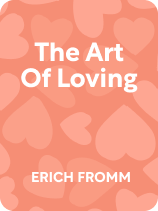

This article is an excerpt from the Shortform book guide to "The Art of Loving" by Erich Fromm. Shortform has the world's best summaries and analyses of books you should be reading.
Like this article? Sign up for a free trial here .
What are the 5 types of love? How is platonic love different from romantic love?
In his book The Art of Loving, Erich Fromm describes five types of genuine love. Those types are parental love, platonic love, self-love, romantic love, and spiritual love.
Let’s explore the characteristics of each of the five types of love, according to Erich Fromm.
1. Parental Love
The first of the 5 types of love is parental love. In Fromm’s view, there are two archetypal types of parental love: maternal and paternal. (Fromm makes it clear that these are archetypes, not descriptions of how any particular real-life mother or father loves their children.) However, parental love is a unique case because neither maternal nor paternal love is truly genuine on its own; rather, when these types of love combine, they create the capacity for genuine love in a growing child.
To understand this, we need to define maternal and paternal love. Fromm believes that maternal love is unconditional. The archetypal mother loves her children simply because they exist, not because they accomplish anything in particular or conform to any outside expectation. According to Fromm, this kind of love makes children feel secure: They know that, no matter what mistakes they make, their mother will always love them. However, this type of love isn’t truly genuine because it is fundamentally one-directional: A child can never love her mother as selflessly as her mother loves her.
(Shortform note: Fromm believes the unconditional maternal love archetype is valuable, despite the fact that, in real life, mothers’ love for their children doesn’t always live up to this ideal. However, other scholars disagree: They argue that this ideal puts too much pressure on real-life mothers, who may not love their children unconditionally, and should be thrown out. Instead, they say we should focus on the kinds of conditions mothers set and how they set them, aiming to do so in the most loving way possible.)
On the other hand, Fromm believes paternal love is conditional. The archetypal father loves his children only as much as they live up to his expectations. This type of love inspires children to work hard, obey, and ultimately excel. However, this type of love also isn’t truly genuine precisely because it’s conditional. (Shortform note: Fromm argues that there’s a place for conditional love in child-raising, but other experts disagree because conditional love can have harmful effects on a child’s wellbeing. For example, research shows that kids who experience conditional parental love have lower self-worth and are more likely to engage in destructive behaviors.)
While neither of these types of love is truly genuine on their own, Fromm believes that over the course of a typical childhood, they combine to produce genuine parental love. At first, very young children are solely focused on maternal love; its presence or absence defines their world. However, older children are more focused on trying to earn paternal love through their behavior and accomplishments. Fromm argues that children who grow into well-adjusted adults learn how to internalize both these forms of love: They see themselves as unconditionally worthy while still holding themselves to high expectations.
(Shortform note: While Fromm notes that young children focus more on maternal love whereas older children seek out paternal love, he doesn’t mention the fact that children must experience unconditional love before they can benefit from any kind of conditional relationship. That’s because unconditional love is the basis of secure attachment, and only children who are securely attached have the solid base of self-worth they need to pursue conditional approval without damaging their self-image.)
| Maternal and Paternal Forms of Love Meet Different Needs Why do we need both maternal and paternal, unconditional and conditional forms of love in order to feel genuinely loved by our parents? Fromm isn’t clear, but it may relate to two of the most primal social needs that all humans share: the need to belong and the need to feel special. Psychologists agree that the need to belong to a group is a critical human need that stems from deep in our evolutionary history. Maternal, unconditional love satisfies this need because we can never lose unconditional love, so we’re confident that we’ll always belong. On the other hand, as much as we need to fit in, we also need to stand out and feel special and important compared to other people. Paternal, conditional love satisfies this need because, in Fromm’s view, father figures don’t have to love us—so if they do, it affirms our belief that we must be special and important. This is why praise from someone who doesn’t love you unconditionally can feel more validating than praise from a loving mother figure. |
2. Platonic Love
Platonic love is a form of non-romantic love directed at all fellow humans, whether strangers or friends. According to Fromm, platonic love is love in its most fundamental form because it is an expression of recognition that we are all part of the human family. (Shortform note: Contrary to Fromm, in The Four Loves, C.S. Lewis argues that the love between friends is the least fundamental or natural form of love because it’s not biologically necessary for the survival of the species in the way that parental or romantic love is.)
3. Self-Love
Fromm believes that platonic love should extend to all human beings—including ourselves. He argues that loving yourself doesn’t mean being selfish: In fact, selfish people act in their own best interest because they lack self-love. Because they don’t truly love themselves, they try to artificially manufacture feelings of self-love and self-worth by acting selfishly.
(Shortform note: Fromm sets up a fundamental difference between self-love and selfishness; however, according to modern experts, sometimes self-love requires a bit of selfishness. In other words, sometimes self-love requires putting your own needs before the needs of others. For example, self-love might require an exhausted parent to be “selfish” and take a half-hour to rest, even when that means saying “no” to playing with their child.)
4. Romantic Love
According to Fromm, true romantic love is simply an intensified version of platonic love. This means that you cannot embody true romantic love without feeling platonic love for people in general.
To Fromm, romantic love is a combination of effort (loving someone on purpose, through action) and individual compatibility. Effort is what distinguishes genuine romantic love from simple sexual desire or from the feeling of “falling in love,” neither of which are fully-realized forms of genuine love.
| Mapping Fromm Onto Sternberg’s Triangle Fromm’s description of romantic love was a predecessor to psychologist Robert Sternberg’s triangular theory of love. In Sternberg’s model, “consummate love” (his name for full, healthy romantic love) is made up of three components: passion, intimacy/liking, and commitment. Like Fromm, Sternberg argues that if any of these components are missing, the relationship isn’t true, consummate romantic love. Similarly, Sternberg includes intimacy/liking (the basis for platonic love) as a necessary ingredient of romantic love, echoing Fromm’s assertion that platonic love is a prerequisite for genuine romantic love. |
5. Spiritual Love
Fromm sees spiritual love (or what he calls “love of God”) as another manifestation of the human need for connection, regardless of the specific religious tradition in which it takes place. (Shortform note: In The God Delusion, anti-religion activist Richard Dawkins offers a slightly different interpretation of the human impulse toward spiritual love. He argues that the tendency to engage in spiritual practice stems not from a general desire to connect with others, as Fromm asserts, but from the specific urge to obey authority figures. In Dawkins’ view, if there were no religious authority figures to placate, humans would have no need for spirituality at all.)
However, Fromm also believes that different religious traditions conceptualize spiritual love differently. In his view, Western religions (like Christianity and Judaism) emphasize the role of belief in their spiritual practice—the path to the highest spiritual truth depends on thinking the right thoughts. On the other hand, Eastern religions (like Buddhism and Taoism) emphasize action and sensation. For adherents to these religions, spiritual love is more about having a visceral experience, not holding certain beliefs.
(Shortform note: While Western and Eastern religions emphasize different aspects of spiritual love, they’re not exclusive, and all major religions include both intellectual and visceral components. For example, the traditional Jewish values of avoda (service) and d’veykut (connection to God) both have a more active, visceral emphasis rather than an intellectual one. On the other hand, several parts of the Noble Eightfold Path in Buddhism (such as Right View and Right Intention) focus on holding the right thoughts and beliefs.)

———End of Preview———
Like what you just read? Read the rest of the world's best book summary and analysis of Erich Fromm's "The Art of Loving" at Shortform .
Here's what you'll find in our full The Art of Loving summary :
- Why you might be wrong about what you think of as love
- Why so many people are unhappy, despite having all their basic needs met
- How to genuinely love others to become happier and less isolated






